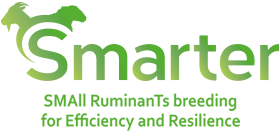
This project has received funding from the European Union’s Horizon 2020 research and innovation programme under grant agreement No 772787.
Editorial
SMARTER is almost at the end of the second period (M36 in October 2021).
Once again, we will have our next annual meeting by video conference because of the COVID crisis. The agenda for the remote SMARTER includes 3-hours meetings per WPs from 11th to 22nd of October and will allow for an overview of the work achieved during the second period. An in depth evaluation of the COVID-19 impact has been achieved at the WP scale. Many experiments and interviews were stopped, or partially reached. Remedial action was taken so that the impact on the overall project would be limited. We have requested an 8 month extension to postpone the end of the project from 31st October 2022 to 30th June 2023. This will allow partners to better consolidate their respective results and provide more time for integrating results obtained by the different groups. As well, an eight month extension would provide a wider opportunity for disseminating and communicating the technical results of WPs (conference, roundtables, stakeholder meeting, website and social media material, etc.). If the request for an 8-month extension is not accepted, the consortium then requests a 6-month extension, which is absolutely necessary to minimise the impacts of covid on the project and to achieve the objectives initially set in the DOA. The extension demand is currently under evaluation by the REA.
Despite the sanitary crisis, many new research results were delivered recently, with 7 papers submitted in 2021. New results were published on feed efficiency in Uruguayan parasite resistance sheep lines (WP1) and on genetic parameters for parasite resistance in Scottish Blackface sheep (WP2). Moreover, this newsletter highlights 3 papers from WP3 with, 1) review on Livestock disease resilience from individual to herd level, 2) a meta-analysis of genetic parameters for resilience and efficiency traits in goats and sheep, and 3) a paper that characterizes resilience in SMARTER experimental longevity goat lines. New methods for maintaining genetic diversity in genetic conservation programmes were proposed (WP5). Progress towards international genetic evaluations (WP6) has been made. Indeed, first analyses of cross-country merged data were achieved for western Pyrenean Dairy Sheep (Spain and France), in Saanen and Alpine goats (Canada, France, Italy, Switzerland). Additionally, a paper on cross-country evaluations for Texel sheep between Ireland and the UK has been published. Moreover, harmonization and wider international cooperation is being promoted by a multi-lingual questionnaire that was widely shared amongst partners. WP4 (genetic diversity) and WP7 (balancing breeding goal) consolidate their data collection and methods before analyses can progress.
The dissemination has been affected by the delays experienced by the project. Such problems were mainly due to the impossibility of travelling to participate in conferences and organizing informative events with major stakeholders. For example, only a remote ICAR Annual Conference in 2021 where a specific SMARTER session was organized. A mixed EAAP Annual Conference in 2021 was organised in August in Davos (Switzerland) where several SMARTER partners presented their work. We hope that the roundtables with stakeholders can take place early 2022 (within each country) as initially planned.

